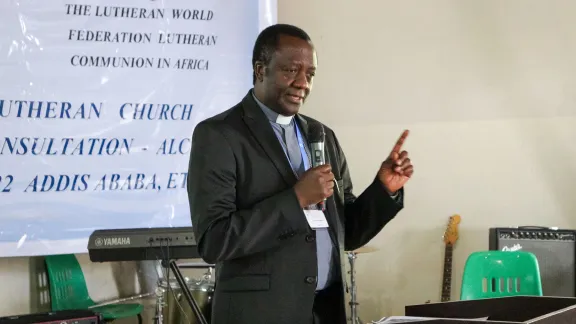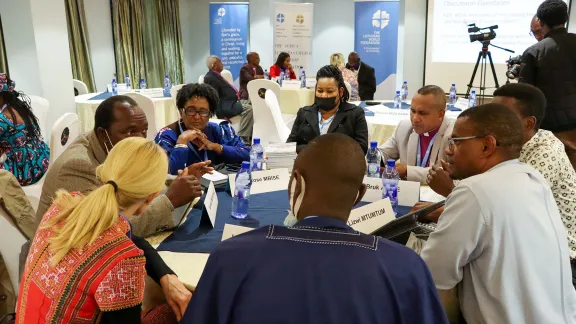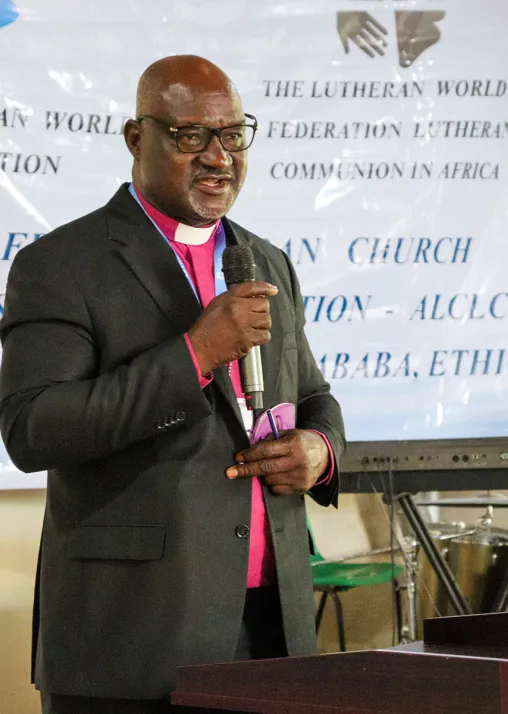Sound theological education and formation is key to transformation

Rev. Dr Fidon Mwombeki, General Secretary of the All Africa Conference of Churches, delivering his keynote address at the ALCLC. Photo: LWF/ALCINET Erick Adolph
(LWI) – Lutheran churches in Africa have underlined the urgent need to address “the pervasive and abusive nature of false teachings and misleading theologies.” The focus, they said, must be on sound theological education and formation that brings about transformation in people’s lives and society.
Leaders of The Lutheran World Federation (LWF) member churches in Africa named this as one of their priorities as they reflected on a keynote presentation on misleading theologies at the bi-annual Africa Church Leadership Consultation (ALCLC), held 27 June -1 July in Addis Ababa, Ethiopia.
In his presentation, Rev. Dr Fidon Mwombeki, General Secretary of the All Africa Conference of Churches (AACC) referred to a survey by the continental body that identified three types of misleading theologies—heretical, mystical and syncretic— that are increasingly becoming mainstream even in well-established churches. He went on to discuss the four themes that project these theologies, namely wealth and poverty, health and healing, power and authority, and the role of government in regulating religious affairs.
Mwombeki pointed out that while misleading teachings are not new and they affect all churches and world regions, their impact on people’s lives is catastrophic. They offer false hopes and promises of wealth and health, enslave people’s minds, and disregard the role of science and readiness to reason, all of which drive many people into destitution and some to death, and a return into superstition.
Proper teaching and doctrine
The effects of these theologies on mainline churches include lack of focus on proper teaching and doctrine. “Everybody is trying to be more charismatic and inspire people, but real solid teaching of what we believe and why is less.” The AACC general secretary spoke of the changing ecclesial structures that include ministries that are not constitutional, such as the function of “a prophet.” There is also a change in the style of worship, and one cannot help but “ask if this is the death of liturgy or the development of new ones.”
But what is even more catastrophic, Mwombeki went on, is the changing image of the pastor or bishop. “When someone tells you ‘I am a bishop’, do you know any more what that means?” People are calling themselves pastors and claiming the same authority and legitimacy as those educated and formed as clergy. “Is there a difference between a pastor and traditional doctor claiming to cure COVID-19? Or, between a conman [or conwoman] and a pastor who demands money promising good luck and nothing happens?” Mwombeki asked.
Citing simplistic biblical interpretations of Jesus’ teachings such as the Sermon on the Mount, he encouraged churches to be conscious of signs of the wrong prosperity theology. These include an absence of doctrine normalcy when it comes to explaining suffering and pain, self-prominence and incomprehensibility of God, lack of serious engagement with complex scriptural interpretation, and a preacher’s extravagant life style and demands.
Christ’s teachings have not changed, Mwombeki said. The duty of the church against misleading theologies, must be centered on the Gospel of Jesus Christ.
Strengthen Bible study
In group discussions, the ALCLC participants said the proliferation of misleading theologies stemmed from the churches’ failure or incapacity to reach out to people with a prophetic message that engages them in interpreting the Bible message from a perspective of their daily realities. “Our people just accept things as said by the pastors and leaders. They need to be liberated and allowed to ask questions for clarity,” noted one participant.

ALCLC Teilnehmende während einer Gruppendiskussion. Foto: LWB/ALCINET Erick Adolph
On theological education, participants expressed the need to assess what “is missing in our theology and reveal it in a way that is not misleading.” Programs in theological colleges and seminaries should reflect the contextual concerns of the churches.
There was also criticism of Lutheran churches, when it comes to taking care of their pastors. Poor remuneration and pastoral care were mentioned as key concerns. Citing the Apostle Paul who was also a tentmaker, one young participant said, “He had to work, but Paul had no school fees to pay, or house and telephone bills.”
Participants emphasized that until churches “educate our people,” strengthen Bible study, and “speak out the truth” misleading theologies will continue to spread.

LWB-Präsident Panti Filibus Musa, der Erzbischof der Lutherischen Kirche Christi in Nigeria (LCCN) in seiner Reade an die ALCLC Teilnehmenden in addis Abeba, Äthiopien. Foto: LWB/ALCINET Erick Adolph
In his greeting to the consultation’s participants, LWF President and Lutheran Church of Christ in Nigeria (LCCN) Archbishop Dr Panti Filibus Musa, reminded the church leaders that “we can no longer be church in this changing landscape as if we are still in the 19th or 20th century.” He emphasized the need for theological training and formation and pastoral ministries that are “in touch with the existing realities of the people” while continually deepening understanding of the communion’s Lutheran identity.
“It is necessary that we constantly reflect on how we proclaim the liberating gospel to the people in the circumstances they find themselves,” Musa added.
The Africa Lutheran Church Leadership Consultation (ALCLC) brings together delegates representing all leadership levels of LWF’s member churches in Africa. The objective of the bi-annual meeting is to support churches in deepening relationships, building a shared theological understanding and reflecting together on being a resilient church in times of challenges. The 27 June -1 July ALCLC was jointly hosted by the Evangelical Lutheran Church in Cameroon and the Ethiopian Evangelical Church Mekane Yesus, in Addis Ababa, Ethiopia.


